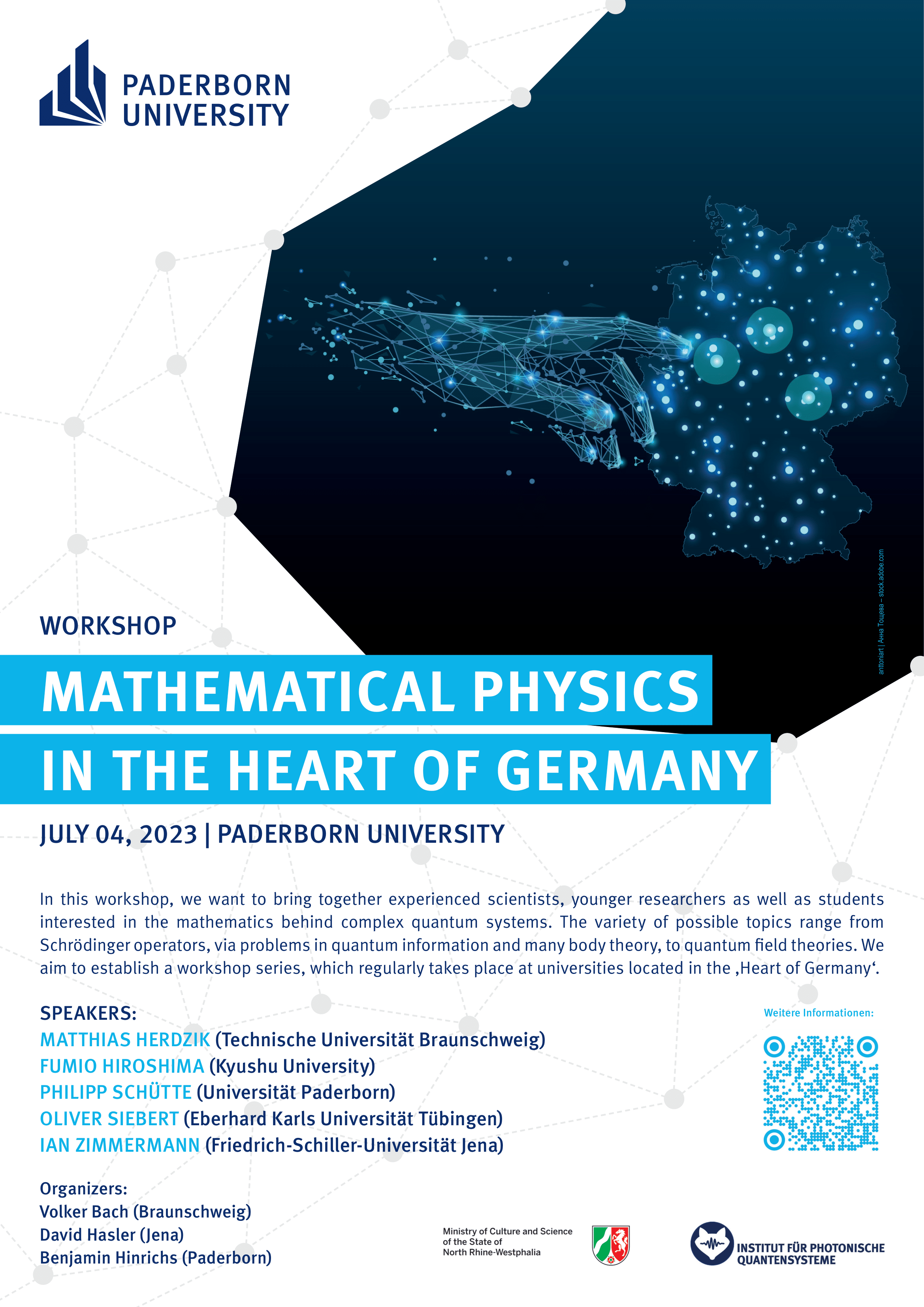Workshop 'Mathematical Physics in the Heart of Germany'
Date: 04.07.2023 / Location: Paderborn University
In this workshop, we want to bring together experienced scientists, younger researchers as well as students interested in the mathematics behind complex quantum systems. The variety of possible topics range from Schrödinger operators, via problems in quantum information and many body theory, to quantum field theories. We aim to establish a workshop series, which regularly takes place at universities located in the 'Heart of Germany'.
Speakers:
Matthias Herdzik (Braunschweig)
Fumio Hiroshima (Fukuoka)
Philipp Schütte (Paderborn)
Oliver Siebert (Tübingen)
Ian Zimmermann (Jena)
10.00 - 10.30 Welcome & Coffee @ J2.138
Morning Session @ Lecture Hall H4
10.30 - 10.35 Opening
10.35 - 11.30 Philipp Schütte (Paderborn)
11.40 - 12.35 Oliver Siebert (Tübingen)
12.35 - 13.30 Lunch
Afternoon Session @ Room L2.202
13.30 - 14.45 Fumio Hiroshima (Fukuoka)
14.45 - 15.15 Coffee @ L2.201
15.15 - 16.10 Matthias Herdzik (Braunschweig)
16.20 - 17.15 Ian Zimmermann (Jena)
18.30 Workshop Dinner @ Haxterpark
Matthis Herdzik: On the Ground State Energy of an Electron coupled to the Quantized Radiation Field
In this talk, various approximations to the ground state energy of the Pauli-Fierz Hamiltonian are presented. These include the results of Bach, Breteaux, and Tzaneteas (2013) and of Bach and Hach (2022). Recent work is presented in which the methods developed in these papers have been applied to the corresponding Bogolubov-Hartree-Fock variational problem. Investigations on possible symmetries of the minimizer, with the aim of simplifying its determination, are presented.
Fumio Hiroshima: Semi-classical analysis in quantum field theory
This is the joint work with Zied Ammari and Marco Falconi.
The Newton-Maxwell equation is derived from the semi-classical limit of the Pauli-Fierz Hamiltonian in quantum field theory through the so-called Wigner measure on the infinite dimensional phase space. This is the great extension of the results by P.L.Lions and T. Paul (1993) who studied the semi-classical analysis of Schroedinger operators through the Wigner measure on the finite dimensional phase space.
Philipp Schütte: Weighted Zeta Functions and Invariant Ruelle Distributions for Hyperbolic Surfaces
For a given compact hyperbolic surface there are two natural spectra to consider: The eigenvalue spectrum of the Laplace-Beltrami operator on the one hand and the spectrum of Pollicott-Ruelle resonances of the geodesic flow on the other hand. While the former is a well established model system for quantum chaos, the geodesic flow models classical chaotic free motion and the study of its resonance spectrum is much more challenging mathematically.
In this talk we will start by giving a short overview over the theory of Pollicott-Ruelle resonances on hyperbolic surfaces to then proceed to more recent results on certain weighted zeta functions. By incorporating weight functions they allow us to calculate spectral data beyond resonances by means of a trace formula. Furthermore they are numerically accessible on convex-cocompact hyperbolic surfaces and some example plots will be presented in this setting.
Oliver Siebert: Thermal Area Law for Lattice Bosons
If the mutual information of the Gibbs state between two adjacent regions scales like the area of the boundary region (instead of the volume), we say that a system satisfies a thermal area law. They are well-known for quantum spin systems and other Hamiltonians with bounded local interactions and finite-dimensional local Hilbert spaces. However, those arguments rely on operator norm estimates and do not extend to the case of bosons with unbounded interactions. In this talk, we develop a thermal area law for a class of bosonic lattice Hamiltonians in any dimension which includes the paradigmatic Bose-Hubbard model. One of the main ideas is to introduce a quasi-free reference state with artificially decreased chemical potential by means of a double Peierls-Bogoliubov estimate.
Ian Zimmermann: Blow-up of nonnegative solutions of an abstract semilinear heat equation with convex source
The semilinear heat equation u' = Lu + f(u), where L is a Laplacian, has been studied on manifolds and metric measure spaces and, more recently, on graphs. Under the assumption that f is convex, we give a sufficient condition for blow-up of nonnegative solutions of this equation in the setting of Lebesgue spaces over an abstract measure space. Our work recovers and extends some blow-up results from the three separate contexts mentioned above in a unified framework. The talk is based on joint work with Daniel Lenz and Marcel Schmidt.
Junaid Akhter (Paderborn)
Volker Bach (Braunschweig)
Christian Fleischhack (Paderborn)
Jakob Geisler (Braunschweig)
Helge Glöckner (Paderborn)
Fiona Gottschalk (Braunschweig)
Pia Hamelmann (Paderborn)
David Hasler (Jena)
Matthias Herdzik (Braunschweig)
Fumio Hiroshima (Fukuoka)
Benjamin Hinrichs (Paderborn)
Martin Kolb (Paderborn)
Suchitra Krishnaswamy (Paderborn)
Christian Lejsek (Jena)
Javier Valentin Martín (Bonn)
Pascal Mittenbühler (Darmstadt)
Merten Mlinarzik (Braunschweig)
Julien Pinkske (Paderborn)
Laura Ares Santos (Paderborn)
Philipp Schütte (Paderborn)
Oliver Siebert (Tübingen)
Jan Sperling (Paderborn)
Tobias Weich (Paderborn)
Ian Zimmermann (Jena)
For directions to Paderborn University and a campus map, see this page. The welcome coffee will be served on the second floor of building J. The lecture hall of the morning session is located on the ground floor of building H. The lecture hall of the afternoon session is located on the second floor of building L.
If you need assistance booking accomodation, please contact Mareike Hirche.
The conference dinner takes place at Gasthaus Haxterpark, which is only a short walk away from the university.
In case of any questions, please contact Mareike Hirche or Benjamin Hinrichs.





